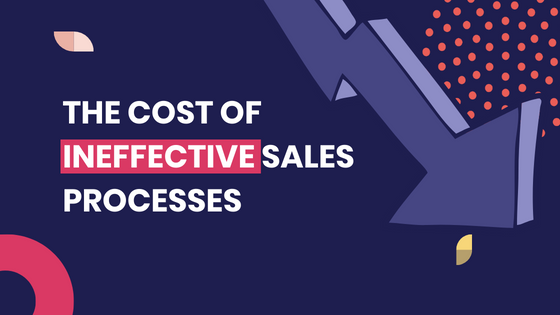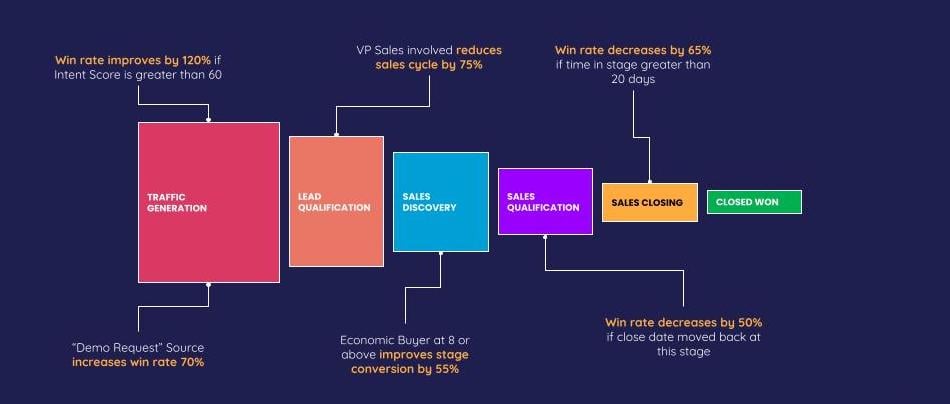






In the past decade, the landscape of sales processes has undergone a profound transformation. No longer is it solely about targeting high-value prospects, but it now requires a more consultative approach rooted in data and analytics.
Nowadays, with the advent of technology and the internet, potential customers have access to an abundance of information at their fingertips. They are more informed than ever before and base their decisions on facts rather than emotions.
This shift has forced sales professionals to adapt their strategies and embrace a more consultative approach, providing valuable insights and expertise to guide customers through the decision-making process.
In this data-centric age, standardising and optimising your sales process is essential. It's imperative to offer valuable information at each stage, empowering buyers to make informed decisions.
The costs of ineffective sales processes can be quantified in terms of lost opportunities, wasted resources, and potential revenue. Without a standardised approach, success in sales may seem like a matter of luck, rather than a systematic optimisation driven by data and analytics.
The Challenge of Non-Standardised Sales Processes
While having a great solution is crucial, effectively communicating its value, capturing buy-in, and more are equally vital components influencing sales velocity.
Companies without a clearly defined sales process may struggle to close deals, leading to resource wastage and revenue losses.
Additionally, varying methodologies, data points, and practices within a sales team hinder systematic optimisation, turning sales success into a game of chance rather than an outcome of data-driven strategies.
Uncovering Inefficiencies in your Sales Process Through a RevOps Audit
To maximise the effectiveness of your sales process, conducting a Revenue Operations (RevOps) analysis and audit is imperative. This will help you identify any areas of inefficiency and map out a winning sales process. A RevOps analysis is a comprehensive review of your revenue processes, extending beyond sales. By reviewing your people, processes, technology and data across your go-to-market teams, you can identify opportunities for improvement and establish a unified approach to revenue generation.
The audit will help uncover any breakdowns in the sales process, such as poor data quality, conflicting messaging between teams, or a lack of alignment between sales and marketing efforts.
By approaching the audit holistically, your business is able to develop a clear understanding of what is working well and where there is room for improvement. This will enable you to identify inefficiencies and make data-driven decisions to refine your sales process.
Analysing Your Sales Funnel with Data
To quantify the cost of an inefficient sales process, a win/loss analysis is essential. A standardised sales process enables revenue and sales leaders to evaluate individual performance at each stage of the sales journey, offering a data-rich perspective on operations.
This approach leverages historical data to identify patterns and trends in your operations, replacing chance with data-driven strategies to enhance revenue growth.
Win/loss analysis involves the systematic examination of deals won and lost, focusing on the identification of key patterns, trends, and insights for future performance improvements.
By scrutinising data collected at each stage of the sales funnel, you can pinpoint areas where prospects drop off and understand the reasons behind it.

Conducting a Win/Loss Analysis: A Data-Driven Approach
1. Define your criteria for a win and a loss
Rely on sales velocity as a key indicator. Consistent conversion of prospects into opportunities is a 'win,' while closed-lost deals are considered a 'loss.'
2. Identify and map the stages at which each deal was lost.
This next stage is critical for identifying process inefficiencies. By understanding the stage at which deals are lost, you can identify where things went wrong and make data-driven decisions to improve the process.
3. Analyse the data collected at each stage
Delve into each stage and analyse the conversations held surrounding each qualification criteria. This stage is where both qualitative and quantitative analysis should be applied to understand the reasons behind lost deals. Explore the characteristics and data points of the deals progress in each stage and those that don't.
4. Identify trends and patterns
Look for common themes or patterns in your data, such as recurring objections or bottlenecks that lead to lost deals. These insights will help you refine your sales process and improve future performance.
5. Refine your sales process
Based on your findings, make informed decisions to refine your sales process and address any identified inefficiencies. This may involve implementing training or coaching, refining messaging or targeting specific market segments.
Final Thoughts
Ineffective sales processes can have a profound impact on a business's bottom line. By dedicating time to analyse and audit your sales process, you can uncover inefficiencies and develop a winning sales strategy that increases sales and business growth. RevOps analysis, sales funnel analysis, and win/loss analysis serve as critical components in mapping a successful sales process. Through a data-driven approach, you can ensure that your sales process is as effective as possible, leaving less room for chance and more room for strategic optimisation.



5 Steps To Replicating Sales Excellence
Moving low performers to high performers using HubSpot.





